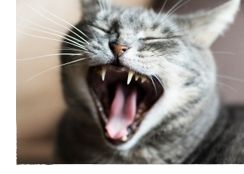
It is very common for us to see an older pet with dental disease but many people can be reluctant to pursue a dental procedure as they are worried about their senior pet having to undergo an anaesthetic.
As our pets age, they may not be as good at fighting off bacterial and viral diseases as they once were so this is the time when good dental health is absolutely essential. Untreated, dental disease can also lead to other problems such as heart disease and kidney disease, not to mention cause your pet considerable pain.
It’s not uncommon for senior pets to have worn-down teeth or be missing the odd tooth and this can potentially affect their ability to chew and digest their food. They may also have painful gingivitis or exposure of the sensitive parts of the teeth secondary to dental disease. Given that our pets can be very good at hiding pain, many owners put the subtle changes of dental disease, such as being a bit quieter than usual or a reduced appetite down to ‘just getting old’.
Veterinary anaesthetics are equivalent to those used in human medicine and are very safe. In order to provide your senior pet with the safest anaesthetic possible, prior to the procedure, we may recommend a blood and urine test to check the overall health of your pet and tailor the anaesthetic protocol accordingly. Your pet may also go on an intravenous drip to help protect their kidneys (if their blood pressure happens to drop during the procedure) and this will also allow them to recover from the anaesthetic faster.
Regular dental checks along with a whole-body examination will help reduce the likelihood of dental issues and ensure your pet is happy and comfortable, something every pet deserves in their old age.
The Pet Doctors team is always happy to discuss any questions you might have about your pet’s health.

